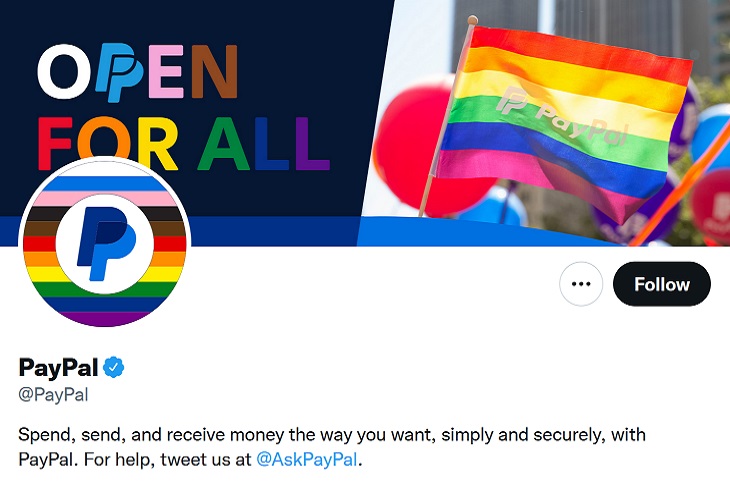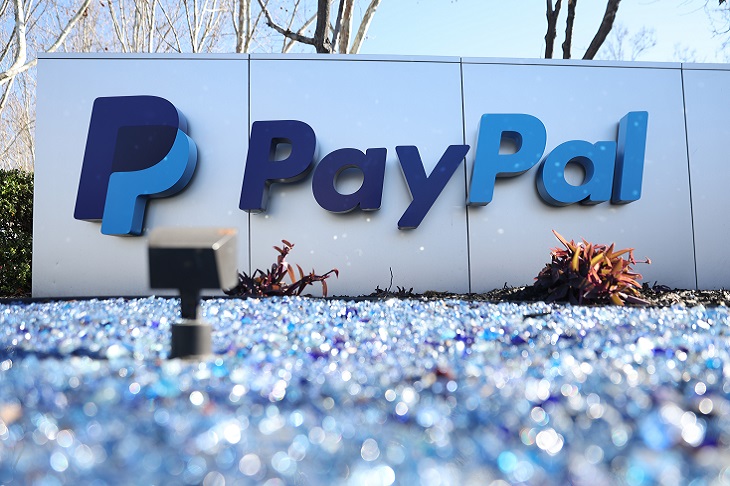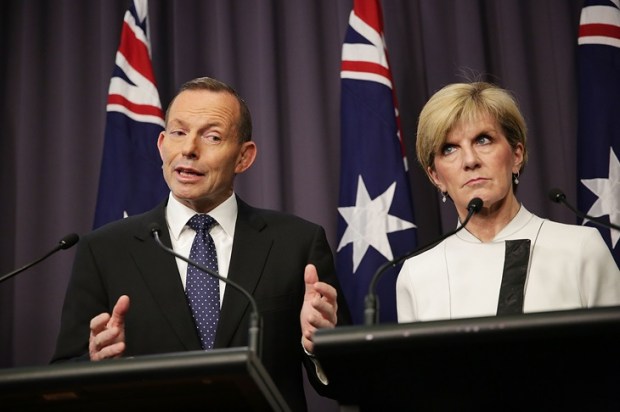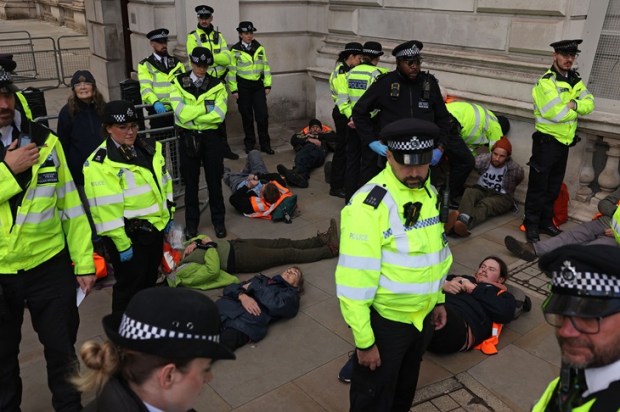When you think of ‘moral puritanism’ and ‘virtue’ the banking sector sits somewhere near lawyers, stockbrokers, and used car salesmen.
Currently, it is Pride Month and banks everywhere have rainbow-washed their logos to show how tolerant and inclusive they are. PayPal may be the most painful, with their logo super-imposed over a rainbow flag and ‘open for all’ printed in coloured letters while Visa went with ‘love lifts everyone, everywhere’.

Screenshot PayPal Twitter account June, 2022

Screenshot Visa Twitter account June, 2022
People don’t go to banks for a lesson in ethics and – until very recently – banks were heavily regulated to ensure that they serviced everyone, regardless of their politics. Access to banking has long been considered equivalent to a human right.
Australia’s human rights watchdog says:
‘A company providing electronic financial services, including ATMs, EFTPOS, internet and phone banking, should ensure that they are accessible to all people, including those with a disability.’
The rise of internet banking companies and the saturation of so-called ‘virtue signalling’ has eroded the regulatory control protecting banking customers by – as is almost always the case in bureaucracy-laden nations – adding more regulation.
Active discrimination was first noticed in organisations like PayPal. Years ago when the online banking community was young, the company was found to be suspending the accounts of high-profile political commentators that the press ‘loved to hate’. These were customers who had not broken the law. Rather, they published articles or gave speeches considered to be controversial or, in some cases, offensive.
In the same way that social media companies like Twitter and Facebook remove people they don’t like by using in-house ‘community standards and safety guidelines’, PayPal cut people’s services off and – astoundingly – continued to hold onto the money for 180 days.
When this first happened, it should have caused a regulatory backlash from the government informing PayPal of its responsibility to customers as a banking provider – not a moral gatekeeper. Governments around the world have been extremely slow to adapt to the internet and the persecution of free speech by the online banking industry was shrugged off as a ‘non-event’. Worse, governments now see social media and banking as a way to influence politics with the creation of ‘social licences’, so there is little hope they will do anything useful.
Fast-forward and the online banking industry is leading the brick and mortar banks when it comes to ideology. Their moral policing has rubbed off on traditional banks like Mastercard and Visa who have joined in the censorial party. Not only are writers in the firing line (and the bar for offense lowered so far it can be tripped over on the way to the local cafe), but Mastercard famously changed its customer policy resulting in the sex-work industry being demonetised overnight when they refused to do business with PornHub and OnlyFans. Like all bad ideas, it was done in the name of ‘safety’.
Junkee covered the case of a woman they refer to as ‘Kate’. As a sex worker, she was refused a bank account with Suncorp and NAB, while the Commonwealth Bank wanted to charge her a $500 annual fee due to her being ‘high risk’ – remember, this is for a business that is perfectly legal in her state.
If you think discriminating against women in the sex industry doesn’t fit the ‘pro-women’ narrative that the banks promote to the public, you’d be right.
This behaviour extends to third-party gateways that handle money such as GoFundMe. They made headlines after suspending the accounts of Canadian Freedom protesters before threatening to give their money away to a charity of GoFundMe’s choice that better aligned with their values. They backed down from what many described as ‘theft’ and handed the money back.
KoFi – a much smaller payment company – has removed several Australian political writers for penning pieces about human rights and liberty, classifying them as ‘high risk’ in the eyes of payment providers like PayPal, whom they deal with.
Payment gateways attack political writers more than any other group online. Forget ‘fighting criminal activity’ what they really don’t want is people writing against their pet ideological projects.
Anti-war publications such as Consortium News and the MintPress News – who are described as left-wing journals that have been critical of America and Nato during the current war with Russia – had their PayPal accounts cancelled without a warning or explanation, except for a small note that said:
‘We noticed activity in your account that’s inconsistent with our User Agreement and we no longer offer you PayPal services … because of potential risk exposure, we’ve permanently limited your account.’
This ban was then extended to the personal account of the founder of MintPress.
‘I believe this is a case of “ideological policing”. Indeed, this is wartime censorship even though the US is not officially at war,’ said Consortium editor Joe Lauria.
Post Millennial journalist Ian Miles Cheong posted on Jan 5, 2022 that:
‘PayPal just informed me that they have permanently banned my account. Without giving an explicit reason why, the supervisor was extremely rude and implied that it had everything to do with my politics.’
He added that, ‘They wouldn’t let me know which rule I broke or how, gave me a lecture instead on how journalists don’t reveal sources. When I pressed them on whether it was my politics, they seemed to imply that it was – the guy was really rude – and commented that “on issues regarding politics, PayPal remains neutral”.’
PayPal CEO Dan Schulman has previously spoken on similar instances of PayPal removing accounts and said that he stands by the company’s acceptable use policy that advocates against ‘violence, hatred, or racial intolerance’.
No, that doesn’t appear to cover organisations like Black Lives Matter who fuelled actual violence and criminal damage based on racial prejudice against white citizens during months of rioting where over a dozen people died and billions in public damage was committed.
‘[There’s a] fine line between what is hatred and what is free speech and who we do allow to fund-raise using PayPal or Venmo, and who we don’t.’
It is a position that PayPal does not have to prove or allow their decision to be contested. They simply remove writers, journalists, and content creators and seize their funds for 180 days despite there being no accusation of laws being broken. This leaves journalists ‘guilty’ of hate speech in the court of ‘social justice’ with no ability for them to protect their employment.
Banks and financial institutions are not meant to have this power.
Imagine being sent a notification that your home loan has been cancelled because you said that women’s sport should only be for women – or that women are biological females.
We are not there yet, but with financial companies championing Climate Change and Social Justice, it is only a matter of time.
This is well and truly a world where social issues are being artificially manipulated by financial institutions just as medical coercion was perpetrated via government mandates that ‘totally weren’t mandatory’. The end result is a so-called democracy that is too afraid to speak freely and contradict the dangerous, irrational, and often outright false demands of primarily Marxist activist mobs.
Got something to add? Join the discussion and comment below.
Get 10 issues for just $10
Subscribe to The Spectator Australia today for the next 10 magazine issues, plus full online access, for just $10.


























Comments
Don't miss out
Join the conversation with other Spectator Australia readers. Subscribe to leave a comment.
SUBSCRIBEAlready a subscriber? Log in